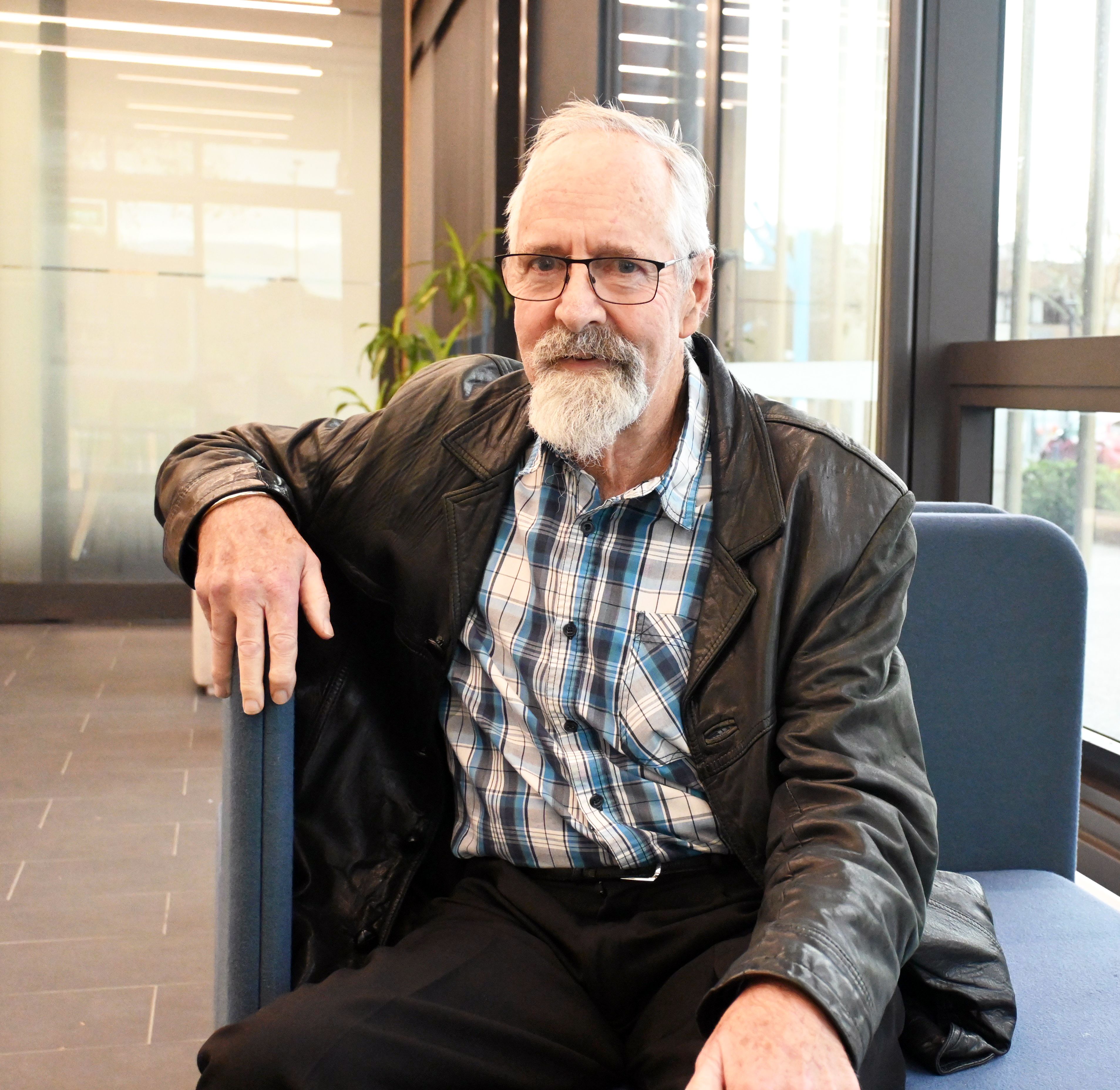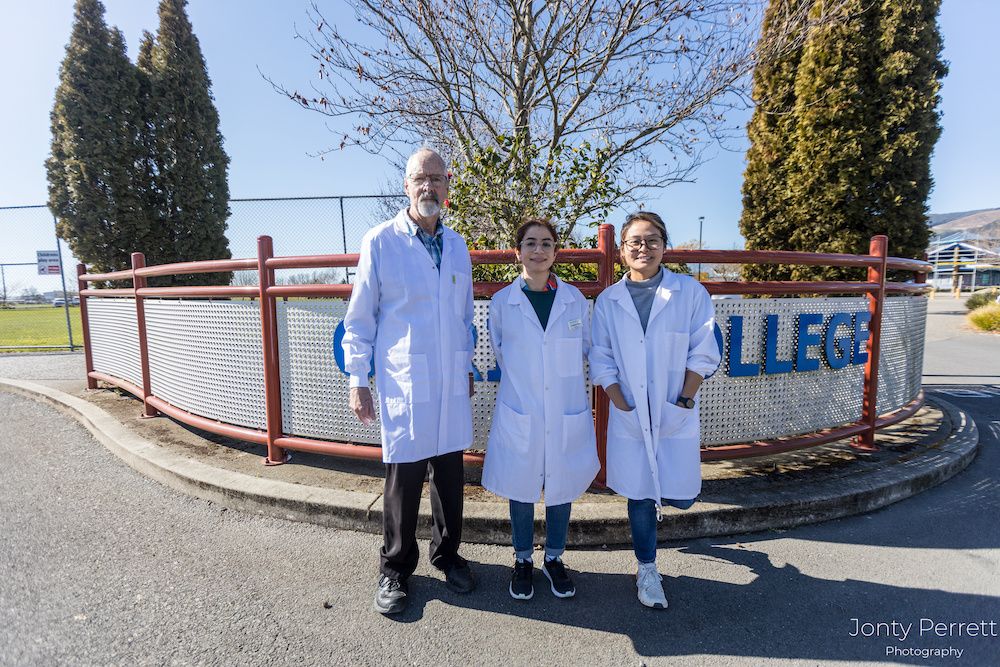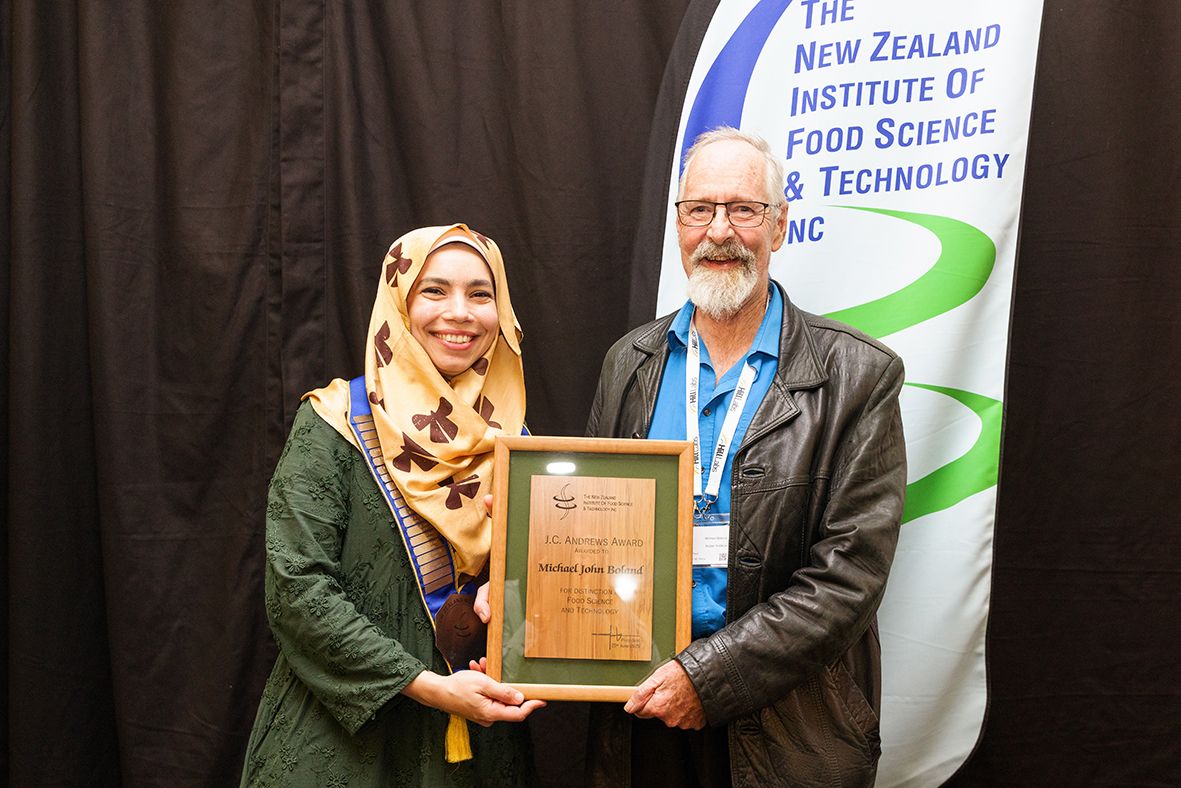Riddet Fellow and Massey alumni wins the JC Andrews food science award

Dr Mike Boland's substantial career in food science innovation and dynamic entrepreneurial skills have been recognised in a JC Andrews Hall of Fame Award.
10 July 2025 - Renowned expert in food science Dr Mike Boland is this year’s recipient of the JC Andrews Hall of Fame Award.
The Riddet Institute Fellow was presented the award last month at the New Zealand Institute of Food Science & Technology (NZIFST) Conference dinner in Palmerston North.
Dr Mike Boland has a passion for enhancing health through food, and is known for fusing rigorous academic research with dynamic commercial innovation and an ability to find new technical solutions.
Feilding born and educated at Massey University, Dr Boland is highly regarded both in New Zealand and internationally. He graduated from Massey University with a BSc (honours) in 1971 and a PhD in 1974.
Riddet Institute Acting Director Distinguished Professor Paul Moughan says Dr Boland’s innovative research career included 25 years at DSIR, another 16 leading research at Fonterra and then 19 with the Riddet Institute as Principal Scientist. This later role saw Dr Boland taking key roles in shaping Institute strategy and leading research initiatives.
“There is no doubt that his has been a distinguished career, further endorsed by his newly minted JC Andrews Award.
“He has significantly advanced knowledge, especially in understanding milk composition, meat processing and the role of kiwifruit in protein digestion.”
Dist. Prof Moughan says Dr Boland’s contributions to science and New Zealand have been outstanding.
“His ability to identify key research areas and set up teams to utilise science for understanding milk processing, food functionality, digestibility, and nutrition has garnered benefits to the New Zealand industry and human health.
“Mike has always had an uncanny ability to spot opportunities and see new directions.
“He was championing research into areas like personalised nutrition, functional foods, natural enzymes, sous vide processing, AI and the internet of things, well before they became mainstream concepts or some of us had even heard of them.”
Retiring this year, Dr Boland will continue to have an influence in his capacity as a Riddet Institute Fellow through advisory or supervisory roles.
During his work spanning more than five decades, Dr Boland developed on- and off-farm research collaborations between NZDRI, Dexcel, the Livestock Improvement Corporation, and AgResearch. He was the Global Programme Leader for the NZ Dairy Board for the Milk Characteristics Programme, overseeing $8M R&D per annum. He authored or co-authored 127 peer-reviewed scientific papers, 40 book chapters and books, 26 abstracts, reports, popular press articles, and 6 patents.
The JC Andrews Hall of Fame Award is NZIFST’s top award and recognises senior Institute members who have made a substantial contribution to science and technology and leadership in the food industry.
Presented annually, the award is in memory of Massey University’s first Chancellor, Dr John Clark Andrews, who proposed that a food technology degree course be established at Massey University.
The Riddet Institute is a Centre of Research Excellence (CoRE) focusing on fundamental and advanced food research. It is hosted by Massey University on the Palmerston North campus.

Dr Mike Boland with Dr Mahya Tavan and Patricia Soh at Nelson's Cawthron Inspire Festival in 2023 where the trio of Riddet Institute scientists ran workshops for school children showing the magic of milk. The learning sessions demonstrated the transformation of milk proteins into butter, cheese and casein, among other experiments. Photo: Jonty Perrett
Questions about the future of food
Q: You recognised the potential of functional foods, and what is now known as personalised nutrition, long before these concepts became mainstream. What is your main advice for eating in a healthy way?
I think there needs to be a readjustment about processed foods and this notion that ultra processed foods are somehow bad. Because it’s lumping together a whole lot of things that are bad with a lot of things that are actually good. It is an oversimplification.
Rather than talk about ultra processed food and what they do to it, we should be talking about the amount of sugar in it: that’s the real problem. Sugar is cheap, most people like the taste and the sweetness, and food manufacturers use it to bulk up food. So it’s very desirable. But it predisposes you to diseases like diabetes. Sugar gives you energy in a big burst you don’t actually need.
There is also too much faddism in food – lots of it from ill-informed and oversimplified information. Too much of anything is bad for you, but not enough of some things, like essential fatty acids, is also bad for you. The key is to eat lots of different things, making up most of your diet from plant foods, and to not eat too much of anything.
Q: You were the lead author of pivotal reports that have sought to guide government policy and food industry leadership to help shape New Zealand’s agrifood industry. To what extent have governments listened to the call to build capacity and transform the food industry for the future?
Unfortunately a lot of it fell on deaf ears. So much good New Zealand-driven advancements and people have gone offshore, and we’ve lost them – everything from science to scientists – because of underfunding and the amalgamation of industries. We did lots of work with companies like Watties, and then they were taken over and stopped all research and development work in New Zealand. Companies like Heinz-Wattie, Glaxo Smith Kline and even Fisher & Paykel have all been taken by multinationals with more funding. Sometimes organisations have gone offshore for cheaper manufacturing possibilities and then been lost.
It's a trend we can’t change. We are just too small to do these things on the scale of the big producers overseas. So we’ve got to survive as niche suppliers and producers.
Q: So given we are a small player in the global food producing environment, what would be the most important ways to boost the New Zealand economy and leverage our agri-food strengths?
We produce enough food to feed our New Zealand population many times over, which means we can feed places like Asia as well, which is a really important thing.
With our climate and our farming methods we produce some of the best quality and economically sustainable foods in the world.
A lot of our farming is about water use, and New Zealand is a water-rich country. Methane production has become a political football and there is a lot of misinformation about it. Because of our efficiencies and that we use pastoral farming methods, the carbon footprint and the methane produced here is lower than anywhere else in the world, and that needs to be emphasised and championed more.

Dr Mike Boland receives the J.C Andrews Award for Distinction in Food Science and Technology from NZIFST President Esraa El Shall at the NZIFST 2025 Conference in Palmerston North in July.
